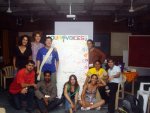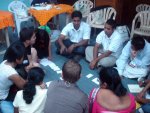

Forever Young, Forever Green
Associated Central Topics:
Education and responsibility .
Environment and responsibility .
Associated General Topics:
Children .
Education .
Environmental education .
Schools .
Teachers .
Youth .
The fourth International Conference on Environmental Education organized by UNESCO, UNEP and other partners in collaboration with Centre for Environment Education, Ahmedabad, India was held in Ahmedabad between November 24 and 28, 2007.
There were around 30 working group sessions varying from Non Formal Spaces of Learning, Education towards sustainability concerns of Natural Resources in Fragile Ecosystems to Youth: Trend setters of Education for Sustainable Development (ESD). More than 100 youth representatives from 25 countries, including India, Rwanda, Costa Rica, Canada, Australia and France had gathered to share their experience and propose their Plan of Action for the Decade of Education for Sustainable Development.
The youth working session had several case study presentations on ESD initiatives involving youth. During the presentation there was a deliberation on the values and principles which guide Education for Sustainable Development.
Almost all the members of the Earth Charter Youth Initiative led by Dominic Stucker (International Coordinator) were present and contributed in many forms at the conference promoting the values and ethics drawing from the Earth Charter.
Anugraha John representing the youth network SAYEN (South Asia Youth Environment Network) presented to the young participants at a workshop on various activities of the World Youth Water Alliance, China-India Forum and local grassroots social activities in Bangalore, India inspired by the Charter of Human Responsibilities.
The participants stressed on the importance of setting up an integrated strategy that could be led, or at least include young people in any effort to achieve sustainable development. It was proposed at the Conference that Not only should ESD target young people, but it should also include them in the design and implementation process, as well as promote youth cooperation.
Working Group 07 "Youth: Trend Setters of ESD"
Youth perspective on Sustainable Development - "Sustainable Development is the commitment to balance all development activities of society while conserving the environment. We must ensure environmental integrity by working together to engage and empower the population, creating a secure future for all."
Recommendations from the youth workshop
- Youth must be included, and trained to participate, in all decision making processes to contribute meaningfully in making sustainable choices.
- Adopt a mutual, collaborative, and intergenerational learning model.
- Integrate ESD into all forms of education, including community based education, such that it is relevant, appropriate, and accessible.
- Use education as a tool to shift the mindset of nations from a paradigm of profit making to one of developing the world sustainably.
- Incorporate the values of sustainability into learning processes, and focus on putting these values into everyday practice.
- There should be inter and intra-sectoral implementation of SD policies across all systems of governance.
- There must be involvement of youth in ESD curricula development. Urge nations to develop a schedule for the implementation of the Ahmedabad recommendations, to develop and a system of accountability.
- Incorporate human rights issues in all development as a strategy to invest.
Reference: Article published in the {Times of India Ahmedabad}, November 26, 2007




